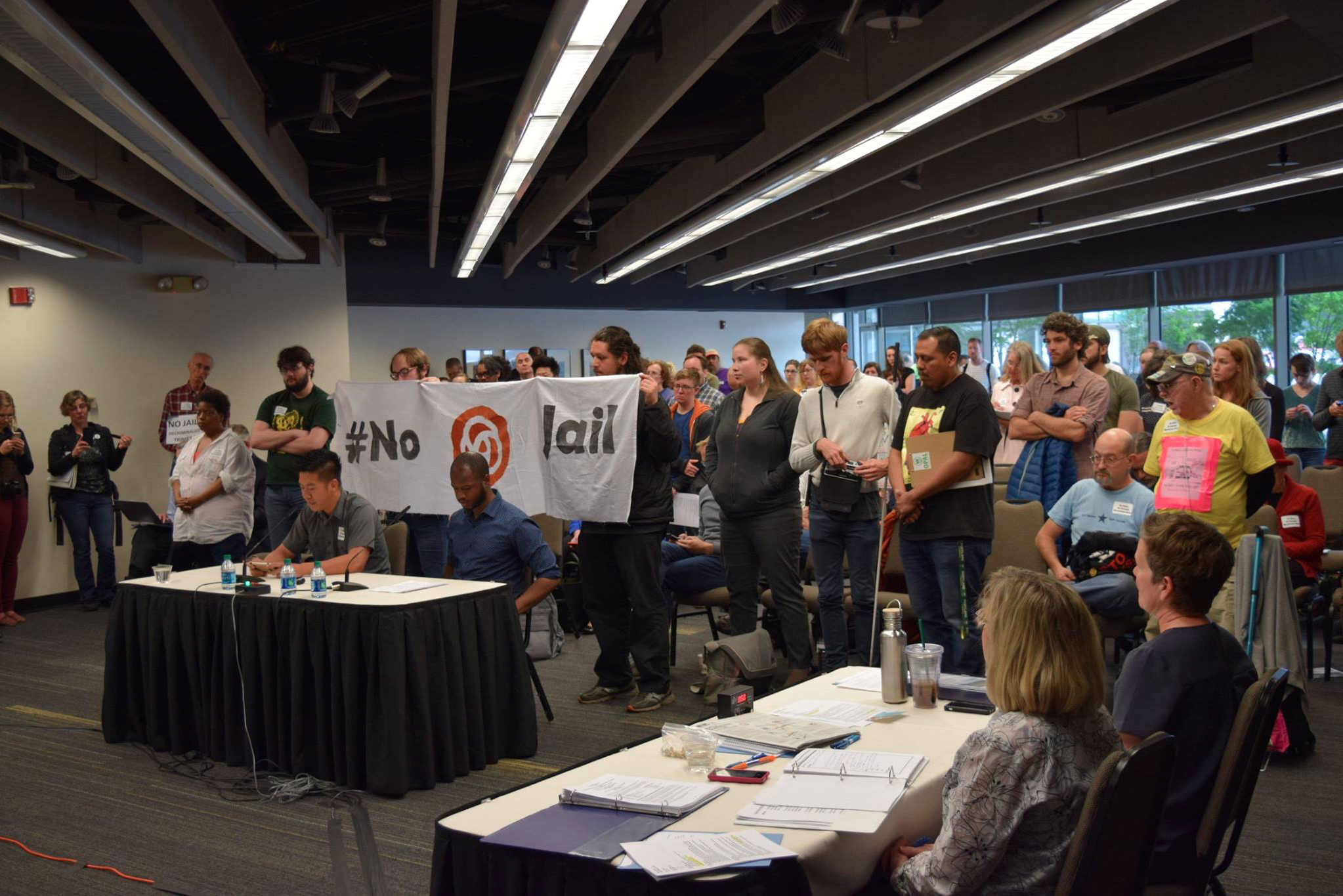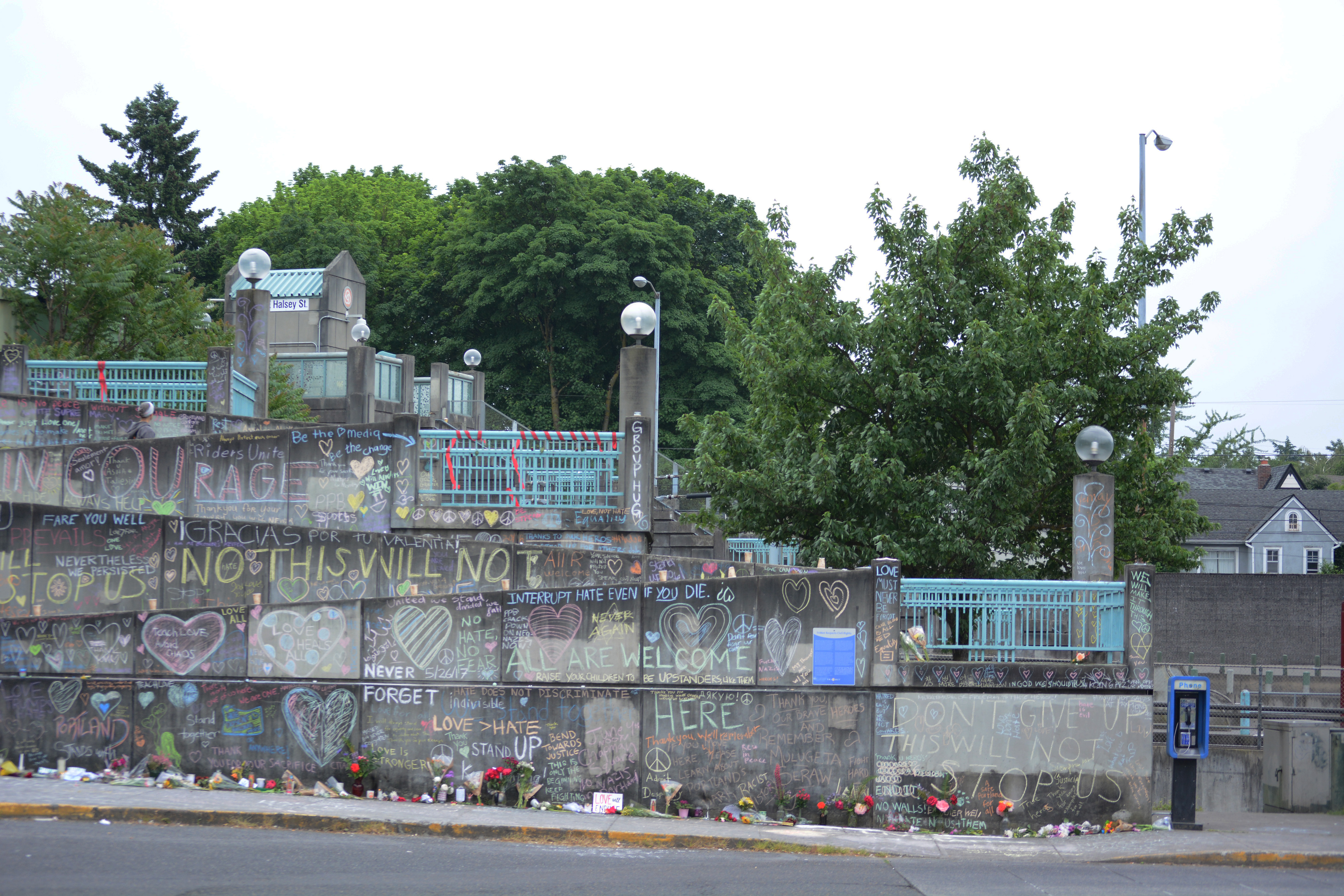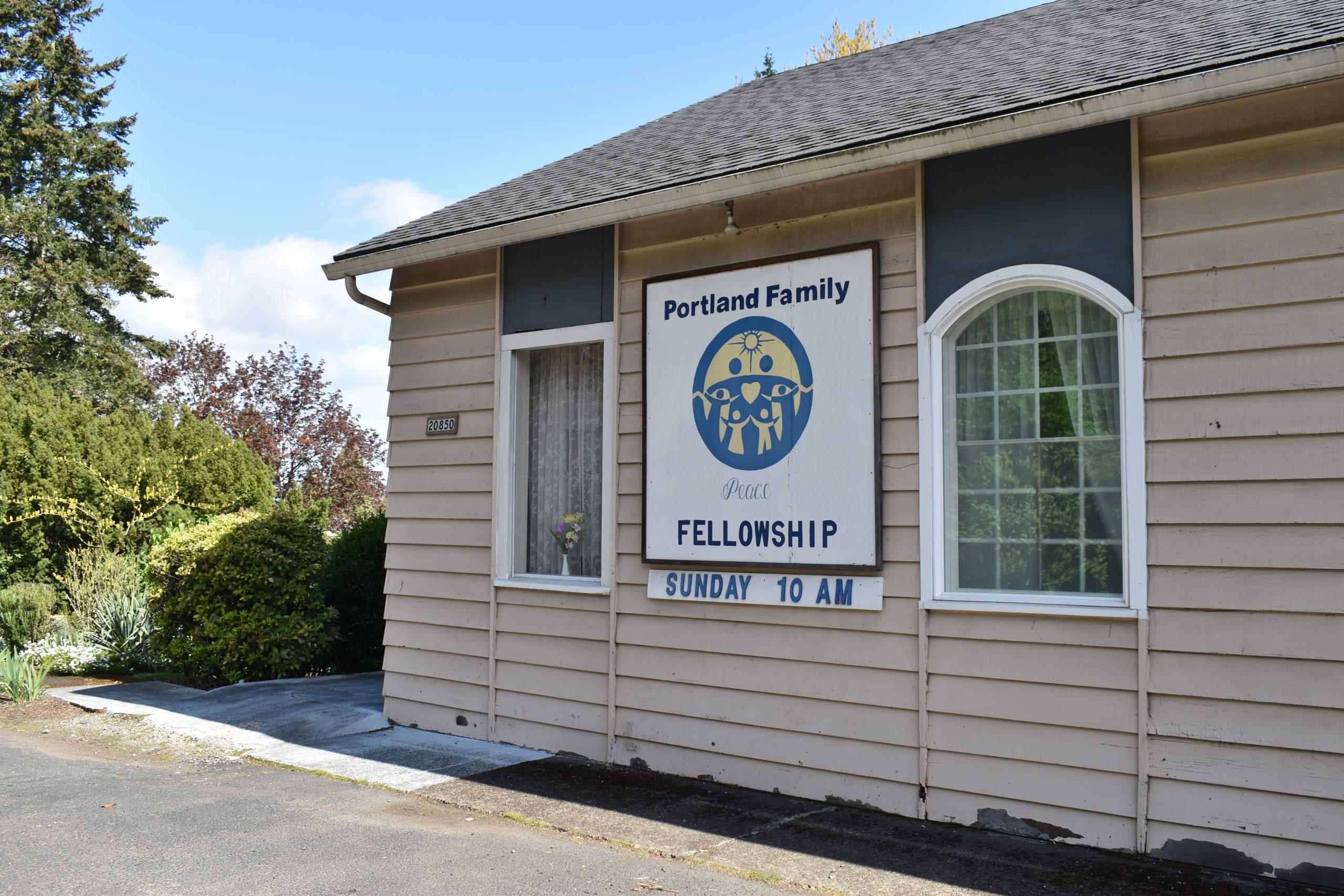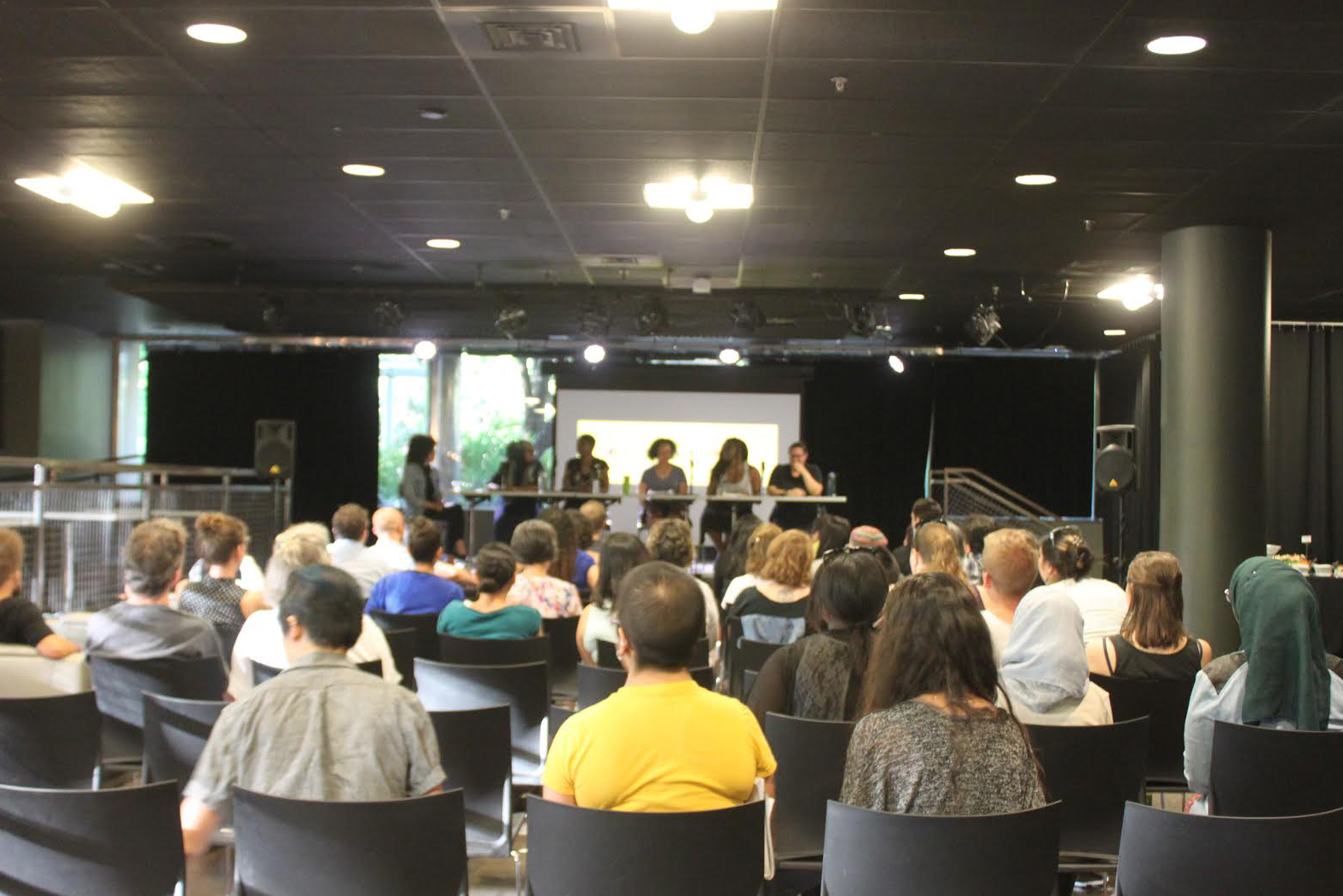A Trimet Board of Directors meeting to approve its new $1.2 billion budget on May 24 attracted a crowd of activists condemning an $11.5 million line item to build a new transit police precinct near the Convention Center in Northeast Portland. The board unanimously approved the budget after hearing testimony from over a dozen people who had either experienced discrimination on transit themselves or who witnessed it of minorities.
Demonstrators held a sign that read, “#no jail” and repeated the phrase, “No guns, no sweeps. Moratorium now,” in between speakers. “Sweeps” refer to fare checkpoints in which officers board trains and request to see riders’ validated tickets.
Though Trimet’s new budget includes increasing frequency of service and maintenance staff, activist groups that have worked with Trimet in the past on low-income fare solutions said that the precinct line item was designed covertly.
Tying many of their arguments to the recent death of Terrell Johnson, the black man possibly struggling with mental illness and drug addiction who was killed by a transit police officer for wielding a utility knife at other passengers, and a Portland State study that found black riders were more likely than others to be banned for fare evasion, demonstrators claimed building a new precinct would further militarize Trimet and target people of color and low-income customers.
Upon giving her support for the budget, BOD member Lori Irish Bauman explained to attendees that the precinct would not be a jail but rather a holding center for transit police to fill out paperwork. The interrogation room, according BOD member Craig Prosser, “is a conference room with tables and chairs. That’s about it.”
Bauman said the budget “advances the principles that Trimet displays in all of its operations. [Those] are equity, excellent service to all customers, and safety of all customers and employees.”
Orlando Lopez, organizer for Bus Riders Unite!, a section of the environmental and civil rights justice organization OPAL Environmental Justice Oregon, said Trimet and its ridership define safety in fundamentally opposite ways.
“Trimet [says they feel] safer with police, but we know people who feel the opposite,” Lopez said. “We both agree safety is paramount, but how we get to that point is where we differ.”
David Bouchard, chair of BRU’s research and advisory committee, advocated in his testimony for unarmed safety monitors and Trimet ambassadors to replace transit police. BRU’s position is that these officers should be trained in de-escalation techniques and should mainly serve to support riders with information to act effectively in emergency situations, rather than police patrons of public transit.
“This could be a program that [would be] nationally-renowned if it is developed correctly,” Bouchard said.
Many activists giving testimony said there have been instances of transit police asking riders their immigration status, something Trimet has publicly denied as a false rumor.
The shooting of Terrell Johnson, claimed Cameron Whitten, Portland activist and one of the founding members of Trimet’s transit equity advisory committee, “put a bright light on the issue of profiling here at Trimet. It’s hard to be a model of excellence when you have blood on your hands.”
Board member Travis Stovall responded to references to Terrell Johnson with an impassioned speech before expressing his support for the budget.
“As most of you can tell, I am a man of color,” Stovall said. “But to sit here sometimes and listen to the accusations that are made is very difficult. Extremely difficult. It calls into question really where my heart and my passion lies. I can tell you right now, I know where it lies and I know where my heart and my passion [are] directed. Is there a problem in our country in regard to how we many times treat people of color? Well, that answer is yes. I live it, I experience it, every single day. And what sometimes pains me gravely is when people use us as an example to push forth an agenda that they have not lived.”
Vice President Dr. T. Allen Bethel added that he, also a black man, has fought for police reform for over 20 years. “When you say no guns to transit police, I never heard your voice when [Kendra] James was killed saying we didn’t need any guns.”
Lopez said Stovall’s experiences as a person of color should not be ignored or invalidated, but the board member ignored the fact that people of color did give testimony of their own discomfort on transit at the board meeting. “Plus,” Lopez added, “we have this PSU report.”
Though PSU criminology professor Brian Renauer said a statistically significant number of black Trimet riders are banned for up to 90 days for fare evasion, the numbers are too small to indicate systemic disparity in Trimet’s fare enforcement policies. “It doesn’t appear fare enforcement on MAX is systemically biased,” Renauer said in an interview with the Oregonian. “But the rate of exclusions for African Americans merits looking into.”
Additionally, despite the difference in experience between Stovall and those who testified on Wednesday, Lopez said, the main issue was that Trimet did not consult the public when planning the new precinct.
The BOD’s vote and discussion proceeded after most of the standing room had dispersed. Lopez said, however, BRU’s work is not finished.
Trimet should “work with community members to include them in the budget process so we can have a say in how it is shaped,” Lopez said. If Trimet wants its customers to feel safe, Lopez added, BRU’s concrete solution is to replace police force with Trimet ambassadors. Because Trimet has multiple contracts with different police agencies, Lopez claimed, BRU is trying to figure out how much power Trimet actually has over their police division.
Jamie Patridge, PSU student leader of 15NowPSU, said fighting for demilitarization of Trimet is a PSU issue since so many students and faculty, many of them low income and people of color, rely on transit to get to school safely. Patridge said more money should be spent to lower fares rather than policing riders. “Who wouldn’t be not paying fares if they [could] afford it?” Partridge said.
Stovall concluded his speech by reminding attendees that fares have remained at $2.50 for the last five years and Trimet worked with community members in 2013 to extend transfer times from 2 hours to 2.5, essentially lowering the fare.
Indeed, many attendees prefaced their testimonials by acknowledging Trimet has a “tough job” and operates with “some of the best bus drivers in the country.” Many speakers, like BRU member Keith Schultz, urged the BOD to “let us help you build a better relationship with your transit riders.”
This meeting took place two days before the May 26 fatal stabbing at Hollywood Transit Center. After Jeremy Joseph Christian hurled racial slurs at two young women and stabbed the three men who came to their defense, Trimet released a statement that said it would be increasing security presence. According to a KGW report, Trimet spokeswoman Roberta Altstadt said TriMet is working closely with the Portland Police Bureau, transit police and other agencies to put more officers on trains and more security personnel on platforms.







Every single time I have seen or been involved in a stop to check validation of tickets… The officers check every single person on board that compartment, regardless of any visible demographics that person may be. The incidents cited in the article are proof that personnel may have the need to be able to respond to these incidents armed. These individuals in the armed response should be rigorously trained, but the idea that a person of authority (and whom is under more regulations that the ordinary citizen) whom is armed immediately poses a threat to any citizen by merit of skin color is the product of paranoia. Those who think that all violent confrontations can be solved with only less than lethal means is ridiculous. There is a need for officers, and officers need to be armed.